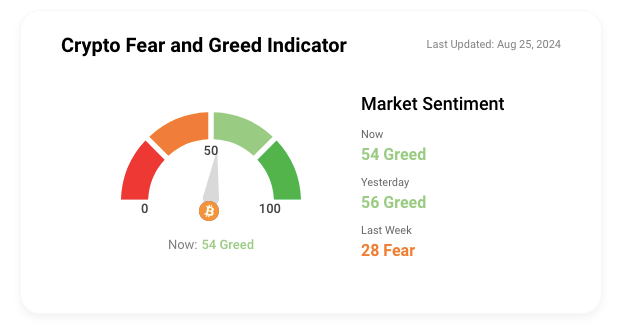📔 Weekly Journal: VR & AI Transforming Mental Health Treatment with Immersive Technologies
[6 min read] Your weekend guide to getting ahead on the digital frontier. Today, the usual market news & how immersive environments and AI are being used to treat anxiety, depression, and PTSD

Welcome to this week’s Weekly Journal 📔, your guide to the latest news & innovation in emerging technology, digital assets, and our exciting path to the Metaverse. This is week 90 of the 520 weeks of newsletters I have committed to, a decade of documenting our physical and digital lives converge.
New subscribers are encouraged to check out the history & purpose of this newsletter as well as the archive.
- Ryan
🌐 Digital Assets Market Update
To me, the Metaverse is the convergence of physical & virtual lives. As we work, play and socialise in virtual worlds, we need virtual currencies & assets. These have now reached mainstream finance as a defined asset class:
🔥🗺️ 7-day heatmap below, showing the current share of the market for the top cryptocurrencies, and their change in price over the last week.
🎭 Crypto Fear and Greed Index is based on volatility, social media sentiments, surveys, market momentum, and a few other bits and pieces. Seems like sentiment is back on the rise.
🗞️ Interesting news from this week
🥽 An international study highlights the potential of virtual reality (VR) and artificial intelligence (AI) in enhancing mental health treatment. VR, when combined with AI, shows promise in addressing anxiety, depression, PTSD, and other mental health issues. Companies like Tripp and Liminal VR are pioneering this approach, creating immersive experiences designed to calm and inspire users. Liminal VR, co-founded by Damian Moratti, offers various therapeutic environments developed with input from neuroscientists and psychologists. Tripp, led by Nanea Reeves, integrates AI into its VR experiences to provide personalised reflections and mindfulness practices. Both companies leverage VR’s immersive nature to create unique psychological effects, aiming to improve mental well-being through innovative technology. Interesting implications for the future of health and well-being!
🔗 Sony has unveiled its new public blockchain, Soneium, which is set to launch a testnet soon. This development follows Sony's partnership with Startale Labs and its significant stake in Sony Block Solution Labs, the entity behind Soneium. The blockchain, built as an Ethereum layer 2 using Optimism technology, aims to leverage Sony's extensive content portfolio to drive Web3 adoption. Sony plans to use Soneium to create engaging Web3 applications and empower creators, striving to make Web3 mainstream. Additionally, Sony's broader Web3 strategy includes a metaverse initiative, a web3 incubator, and various blockchain ventures such as SNFT and S.BLOX. The company is also considering integrating its Web3 activities, including NFTs and stablecoin projects, into Soneium once it's operational.
Ⓜ️ Matthew Ball shared some more absolute gold in an interview this week. If you ever the thought that the Metaverse is only faded hype, read this interview to become re-energised again. Here is my favourite quote:
“Reductively, we should consider the Metaverse a 3D augmentation of the Internet. A more advanced description would be a 3D Internet that is also “live” (today, nearly all Internet exchanges use static or old data) and “shared” (today, video games and Zoom are about the only things we co-experience in real-time).
Fortnite is a platform that hosts tens of thousands of virtual worlds and hundreds of millions of users. It is a microcosm of the Metaverse in the same way Facebook, which spans billions of users and pages, is a microcosm of the Internet. Crucially, much of the underlying technology of Fortnite (i.e. the Unreal Engine) also powers other real-world use cases such as self-driving cars, industrial simulations, and so on.
Nvidia’s Earth 2.0 is an earth-scale climate simulation intended to serve as a platform for smaller simulations (e.g., a city, a building, a fleet of cars) not operated by Nvidia.
These two endeavours are largely disconnected, though they reflect the same trends regarding the capabilities, deployment, and relevance of Internet-enabled, real-time 3D simulations.” - Matthew Ball.
👓 Read of the Week
The read of the week is “AI pioneers want bots to replace human teachers – here’s why that’s unlikely”. Andrej Karpathy, OpenAI co-founder, envisions AI bots as ideal subject matter experts and tutors, offering personalised, on-demand education. This concept is realised through Eureka Labs, which aims to revolutionise education. However, Annette Vee, a researcher in AI and writing technologies, argues that while AI holds promise, students have historically preferred human teachers for their ability to inspire and connect on a personal level. Past attempts, such as teaching machines and MOOCs, have fallen short due to a lack of meaningful interaction.
In my personal opinion, the future of education will likely involve each child having a hypercustomised AI teaching assistant bot tailored to their individual needs. However, these bots should be overseen by real human teachers. This combination ensures that while AI can offer personalised support, the human element remains crucial for genuine engagement, emotional support, and the fostering of diverse thinking. AI can enhance learning, but my view is that it is unlikely to fully replace the essential role of human educators. There is a type of nurturing that only a human can provide.
🎥 Watch of the week
In a shameless plug, this week’s watch of the week is me on stage at a conference this week talking about three pivotal topics: tokenisation of real-world assets, the rise of decentralised AI, and the emerging Decentralised Physical Infrastructure Network (DePIN).
AI 🎨🤖🎵✍🏼
In the Metaverse, AI will be critical for creating intelligent virtual environments and avatars that can understand and respond to users with human-like cognition and natural interactions:
PSA for all iPhone users! Apple is set to revolutionise iPhone functionality with the upcoming launch of "Apple Intelligence," an AI-powered suite debuting with iOS 18. The standout feature is a ChatGPT-enhanced version of Siri, marking a significant upgrade in how users interact with their devices. Scheduled for release alongside the iPhone 16 in September, the AI features will be available in the iOS 18.1 update around October. Apple Intelligence promises a host of new capabilities, including improved writing tools, suggested replies in Messages, email summarisation, and phone call transcription. It will also introduce features like Image Playground and custom emoji creation. Siri’s new integration with ChatGPT will enhance its ability to understand and respond to queries with greater context, making interactions more intuitive.
While concerns about data privacy persist, Apple maintains its commitment to user security. AI data processing will primarily occur on-device, with encrypted, anonymised data sent to Apple’s servers only when necessary. This added layer of privacy aims to protect user information more effectively than using ChatGPT directly.
Overall, I’m looking forward to it. Apple Intelligence is expected to make iPhone use more personalised and efficient, though of course users can opt-out if they prefer.
That’s all for the free version this week! If you have any organisations in mind that could benefit from learning about emerging technology, be sure to reach out. Educational workshops are one of many consulting services I offer.
DCA With Me 🤑
Dollar Cost Averaging is an investment strategy in which an investor regularly invests a fixed amount of money into a particular asset/asset class at regular intervals, regardless of its current market cycle. By doing so, the investor can reduce the impact of market volatility and potentially earn a better return over time. Motto = time IN the market beats trying to time the market
To experiment with this, I invest $50 NZD into a Digital Asset every week. Each week I will choose an asset that seems underpriced in the short term and has positive long-term potential. My timeframe is 3-5 years. I don’t give financial advice but if you want to follow along with me you can use my easycrypto.co.nz referral link to support this newsletter. Let’s dive into this week’s pick:
Keep reading with a 7-day free trial
Subscribe to Metaverse Field Guide to keep reading this post and get 7 days of free access to the full post archives.



